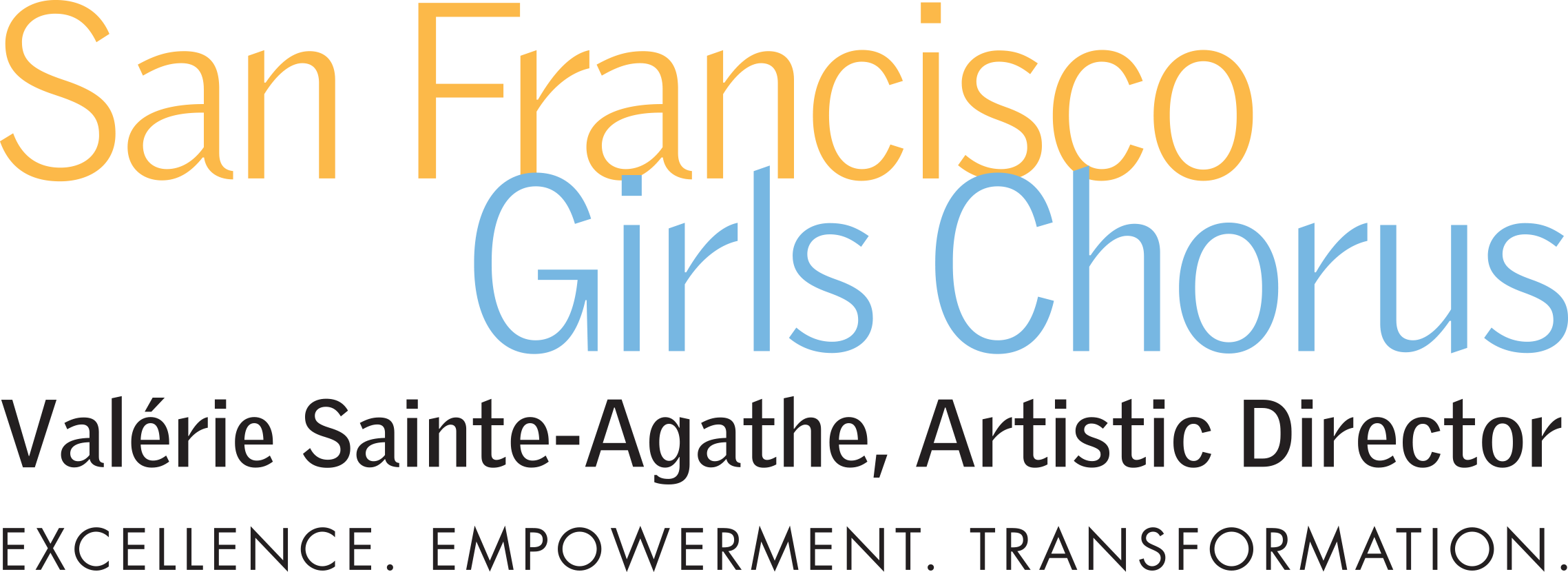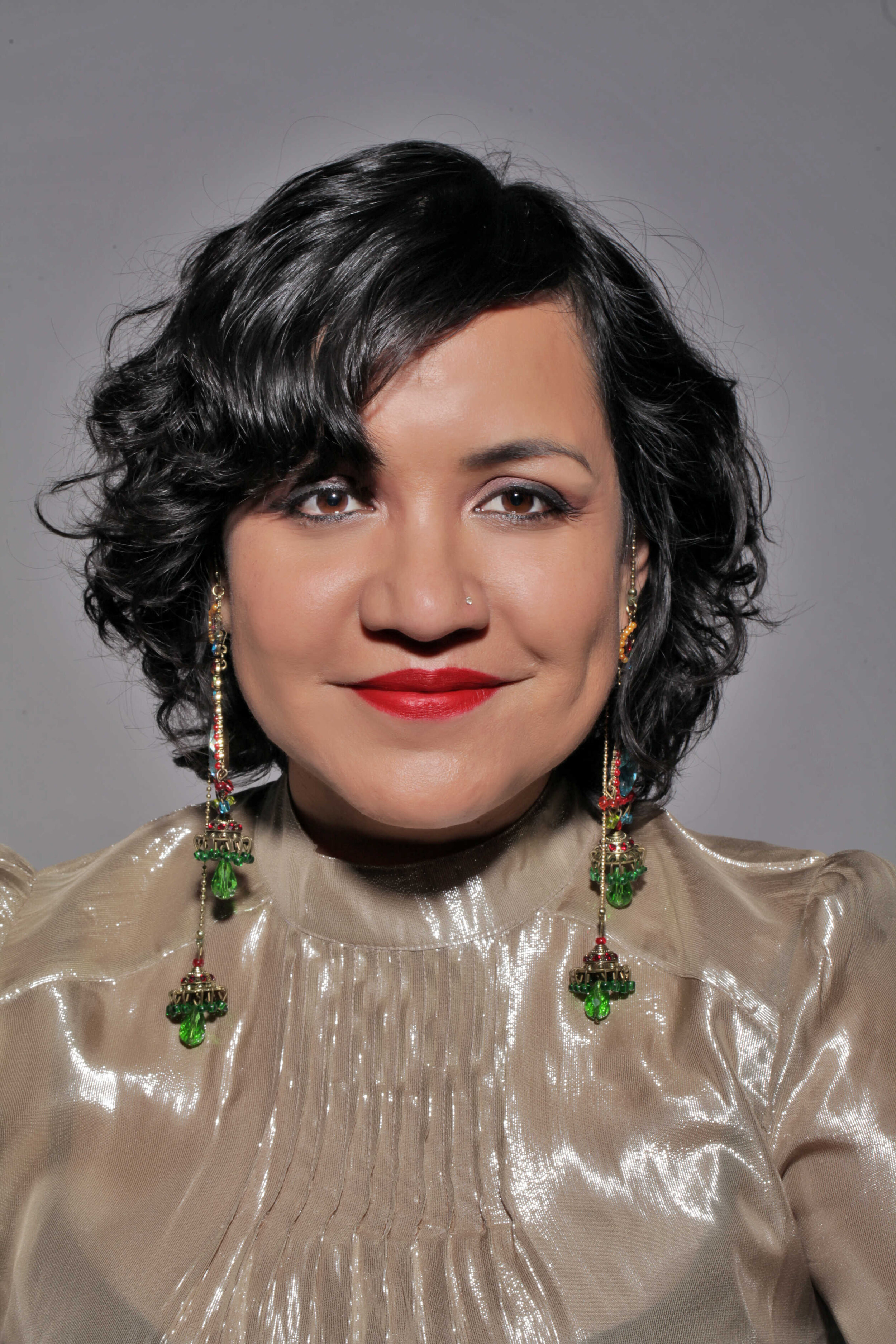Postcard from Martha Gonzalez
This week’s postcard features Chicana artivista (artist-activist), musician and feminist music theorist Martha Gonzales. SFGC was selected as one of six choruses from across the country to participate in a collective songwriting process with Dr. Gonzalez as part of the Radcliffe Choral Society's virtual Rising Voices Festival which took place earlier this month.
How did you first learn about SFGC?
I met SFGC through the Radcliffe Choral Society when I was asked to facilitate a collective songwriting workshop for this year’s Radcliffe Choral Society Rising Voices Festival.
Collective songwriting as a process and method creates space, challenges multiple patriarchal systems, builds community, and can potentially produce knowledge that is accessible to communities beyond the academy.
One of the most important aspects of this process is embodied knowledge and the idea that one is already knowledgeable via socio, cultural, and life experience as we approach a dialogue table. In this way this method has been useful in many spaces for its ability to be inclusive of any and all who come to the dialogue space.
SFGC was one of six choirs across the country I worked with via Zoom to accomplish the shared goal of answering Amanda Gorman’s historic poem The Hill We Climb which was recited at President Biden’s inauguration.
How did you become a musician and a composer?
As the eldest daughter of Mexican immigrant parents, I was born into responsibility. My father’s death from alcoholism left my mother to care for our family of four. Her second-grade education did not obstruct her will to see us out of poverty, but it nonetheless failed to protect us from its truths. Memories of living in our East L.A. neighborhood are fraught with some fear and sadness, yet I am also filled with a sense of gratitude. For in these troubled times, there were school teachers that awakened hope in me. In all, music and the arts were my saving grace. The arts allowed both a momentary relief and a critical consciousness that has served me to this very day.
Identifying music and education as tools of alchemy early in life drew me into mentoring and higher education. I was the first in my family to graduate high school, attend college and receive a PhD. The oral tradition in my family, witnessing music as social movement and years of building in Chicanx Latinx communities has made me see the importance of culture, music, and memory as a tool of resistance and social change. In this way, my life and experience as a Chicana feminist musician, committed to using art as a tool for the redefinition and reconstruction of a global community, are the spirit and energy that fuels my music, teaching, community, musicianship and academic endeavors.
Martha Gonzales (credit Gary Coronado)
Over the course of many years, I have traveled the world as a professional musician. Experiencing music in many fronts’ sites and social locations has demonstrated to me that music is understood and engaged in a number of ways. I have had music experiences that as a performer were oppressive and have left imprints of shame and trauma in my memory. But there have also been moments of hope. Music in this sense was inspiring, a conduit of freedom and malleable tool for those who envision social change.
These moments in particular have allowed me to see how music could be a liberating process, a deliberate act of love, and a source of empowerment for self and community. Such is the case with collective songwriting, I take the opportunity to implement this practice wherever possible. So as a musician and singer/songwriter for my band Quetzal, we record, we play on stage, but we also engage communities on another level. We are equally committed to developing the collective songwriting process and are dedicated to engaging in music as a process that generates feelings of hope and imagination within communities.
At present, I wear many hats. I am a musician, feminist music theorist and Associate Professor in the Intercollegiate Department of Chicana/o Latina/o Studies at Scripps/Claremont College. I am honored to be a Fulbright (2007-2008), Ford (2012-2013) and Woodrow Wilson Fellow (2016-2017). My academic interests have been fueled by my own musicianship as a singer/songwriter and percussionist for Grammy Award (2013) winning band Quetzal. Quetzal has made considerable impact in the Los Angeles Chicano music scene. The relevance of Quetzal’s music and lyrics have been noted in a range of publications, from dissertations to scholarly books. Our latest recording “Puentes Sonoros” (Sonic Bridges) was just released on Smithsonian Folkways in the fall of 2020. I have been active in implementing the collective songwriting method in correctional facilities throughout California and Seattle WA. Most recently, and as a testament to the body of music and community work I have accomplished on and off the stage, in the summer of 2017 my tarima (stomp box) and zapateado dance shoes were acquired by the National Museum of American History. My first manuscript Chican@ Artivistas: Music, Community, and Transborder Tactics in East Los Angeles is out on University of Texas Press.
Quetzal performing at the 2016 Smithsonian
How do you find your inspiration for bringing creativity and imagination into your work with young performers?
I find that youth need no inspiration from me; they are fully equipped with it! They inspire me! They are the ones with all the information; I’m just along for the ride. Collective songwriting is rooted in dialogue and collaboration. The process that I engage in is really weaving their testimonios (lived experience) and the many inspirations and ideas they bring into a song that is composed collectively.
Can you describe the work you are doing with the San Francisco Girls Chorus?
A song as a sonic and literary manifestation is life’s soundscape, a unique, cathartic memento as well as a powerful political tool. A song can also be an important historical text. A person’s testimonio (testimony), life views, triumphs, aphorisms, and struggles can be expressed in song lyrics. In this way, song lyrics can transmit ways of knowing and theorizing about life. It can also be viewed as alternative ways of creating knowledge. When practiced in community, songwriting can be a powerful exercise in consensus building and collective knowledge production. I took SFGC through this important process where they were able to write and arrange a song we worked on collectively. The creation of SFGC's song is wonderful but just as important was the process that yielded important conversations. In this case we were responding to Amanda Gorman’s poem.
Capitalism and the industrialization of music has fundamentally altered how we relate to music. It has gradually rearranged what I call “the social relations of music.” What was once understood as a process, another form of dialogue and a pasttime with members of a community, is now reduced solely as a commodity and profession. Taking them through this process was my way of getting them to think more critically about the kinds of work music can also do.
My scholarship and method does not ask for the abolishment of a profession and or the sale of music. We have all benefited and enjoyed the mastery of those who have decided to give their lives to the craft of music. There will always be an appreciation and market system for these labors. I am interested in reinstating the social appetite for the participatory, music and dance practices that were once a part of our human cultures and to encourage people to look back in their cultural histories and restore the social understandings, protocols that music and dance practices gave communities life in the past.
Collective Songwriting in Boyle Heights
A lot of our choristers have parents who are not musicians - what would you like to tell them about what it means for a young person to be doing music?
Music learning and involvement doesn't have to lead to the professionalization of it. Music can also be a convivial process and way of being in the world. It is cathartic and young people need to have outlets for their thoughts and emotions. We need to recapture the participatory nature of music and dance in our worlds. It is fundamentally human to express ourselves and we can't let capitalism dictate how music should function in our lives. Participatory music and dance practices are fundamental forms of human interaction and nourishment that instill much needed hope and happiness. Not everything we do has to be monetized. Support young people in their expressive selves. Give them the space to do it. It can only help their emotional and creative intelligence.
For those girls who do wish to become professional musicians, is there anything you would like to share with them?
First of all define what success means for you. Don't forget that media (Instagram, Facebook, Twitter, TikTok) is a kind of performance in and of itself and industry defined success is part of what the industry is selling. At the end of the day, know your business! Inform yourself on how the industry works, what it aims to do, who benefits in the end.
Why is it important to continue practicing music and have online performances in this time of pandemic?
Just because we have to be physically distant does not mean we have to be socially distant! We still need each other and need to continue to find opportunities that nurture dialogue in any and all spaces... even the virtual ones!


